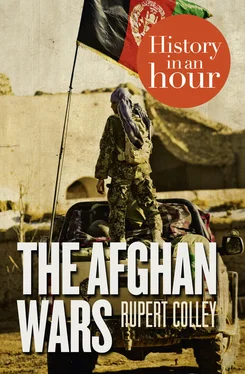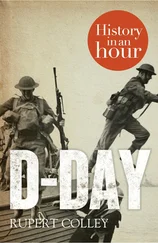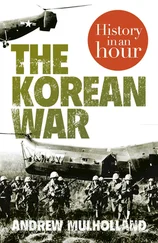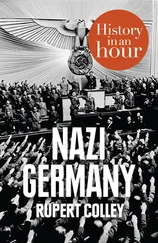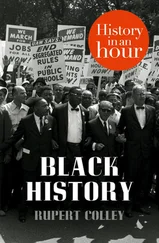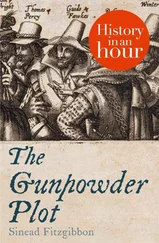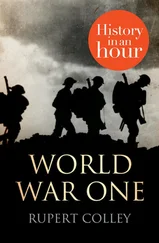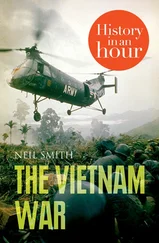Retribution was swift. A force under the command of Sir George Pollock and Robert Sale, husband of Lady Sale, stormed through Afghanistan, relieved the garrison at Jalalabad and, in September 1842, forced its way into Kabul where Lord and Lady Sale were emotionally reunited. But Pollock was too late to save Shah Shuja, who had been murdered in April 1842, or Elphinstone, who had died, a broken man, in captivity the same month. William Nott, one of Pollock’s second-in-commands, described Elphinstone as ‘the most incompetent soldier who ever became general’.
Pollock, who had been ordered to ‘leave some lasting mark of the just retribution of an outraged nation’, blew up Kabul’s Great Bazaar. Then, having rescued the remaining British hostages, he returned to India.
British prestige had been partially restored and its honour satisfied, but with the restoration of Dost Mohammad to the Afghan throne, the whole farcical and tragic episode had achieved nothing.
Thirty-six years later, in 1878, the Great Game was played again.
The Second Anglo-Afghan War Contents: Cover Title Page THE AFGHAN WARS History in an Hour Rupert Colley About History in an Hour Introduction The First Anglo-Afghan War The Second Anglo-Afghan War The Third Anglo-Afghan War The ‘Saur’ Revolution The Communist Era The Soviet War in Afghanistan The Afghan Civil War The Taliban Afghanistan under the Taliban 9/11 The Afghanistan War The Taliban Insurgency The Death of Bin Laden The Ongoing War Appendix 1: Key Players Appendix 2: Timeline of the Afghan Wars Appendix 3: Flags of Afghanistan Copyright Got Another Hour? About the Publisher Конец ознакомительного фрагмента. Текст предоставлен ООО «ЛитРес». Прочитайте эту книгу целиком, купив полную легальную версию на ЛитРес. Безопасно оплатить книгу можно банковской картой Visa, MasterCard, Maestro, со счета мобильного телефона, с платежного терминала, в салоне МТС или Связной, через PayPal, WebMoney, Яндекс.Деньги, QIWI Кошелек, бонусными картами или другим удобным Вам способом.
In 1879, the Amir of Afghanistan, Sher Ali, accepted a Russian presence within Kabul, which alarmed Britain enough to demand their own, to the point that the British army escorted one to the Afghan border. When Sher Ali refused them entry it gave Britain the pretext it needed to mount an invasion.
Advancing in three columns, the British took Jalalabad and Kandahar. The third column, under the command of General Frederick Roberts, took Kabul – by which time Sher Ali had fled. He died soon afterwards, to be succeeded by his son, Yakub Khan.
In May 1879, Yakub Khan and the British signed the Treaty of Gandamak in which, in return for British subsidies, Afghanistan handed over the control of its foreign affairs to Britain and allowed a British envoy to reside in Kabul.
In July, that British envoy, Pierre Louis Cavagnari, arrived, and the Second Anglo-Afghan War was over. Or so the British thought. (Pictured below is Cavagnari, second from left, sitting with the Amir, Yakub Khan, centre.)
Yakub Khan, Amir of Afghanistan, February to October 1879, and Louis Cavagnari (1841–1879)
However, in September, Cavagnari and his fellow Britons were killed. On hearing the news General Roberts, stationed in Simla and preparing to go on holiday, gathered a force and hastened back to Kabul. Yakub Khan rushed out personally to meet him, denying any involvement in Cavagnari’s murder and beseeching Roberts not to attack his capital. Roberts, who found the Amir’s subservience embarrassing, brushed him aside and pushed on.
Once in Kabul, Roberts subdued the locals, rounded up the suspected conspirators, had them executed, and set up fort in a walled part of the city called Sherpur. Remembering the mistakes of the previous war, Roberts built up its defences and fortified it. His precaution was justified as, in December, the local Afghans besieged the fort. The British garrison held out and eventually the Afghans faded away.
Meanwhile, over 300 miles away, outside Kandahar, on 27 July 1880, the British fought a battle against an Afghan force near a village called Maiwand. The British suffered a humiliating defeat (pictured below), with 969 British and Indian soldiers killed and almost 200 wounded. Today some Afghans still raise a toast to the victors of Maiwand. Chased back to Kandahar, the British survivors came under a sustained siege.
Battle of Maiwand: Saving the Guns by Richard Caton Woodville
Roberts, still in Kabul, was ordered to relieve the Kandahar garrison. Thus, setting out on 9 August 1880, with 10,000 soldiers and 8,000 camp followers, and accompanied by almost 10,000 mules, ponies and donkeys, Roberts began the march from Kabul to Kandahar. The convoy covered 334 miles within 22 days, and captured the British imagination, making Roberts a national hero. When the Afghans besieging Kandahar learnt of Roberts’ imminent arrival they turned and fled. Roberts himself fell ill, and much to his chagrin, had to be transported in a doolie (a kind of litter), although as they entered the city on 31 August, Roberts insisted, for the sake of dignity, on riding in on horseback.
A special medal was struck, the Kabul to Kandahar Star (pictured), known informally as the Roberts Star, celebrating Roberts’ achievement.
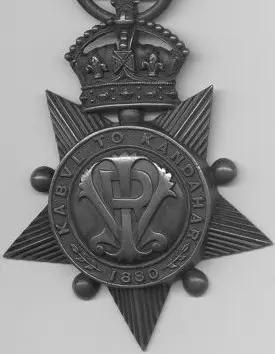
Kabul to Kandahar Star
Roberts then defeated Yakub Khan in the Battle of Kandahar on 1 September 1880, and having settled the more compliant Abdur Rahman, grandson of Dost Mohammad, on the Afghan throne, proceeded to pull out of Afghanistan. Abdur Rahman would remain in power until his death in 1901, while the treaty signed at Gandamak remained in place for forty years. But ultimately, in a repeat of the First Anglo-Afghan War a generation earlier, Britain had won a war but achieved very little.
The Third Anglo-Afghan War The Third Anglo-Afghan War The ‘Saur’ Revolution The Communist Era The Soviet War in Afghanistan The Afghan Civil War The Taliban Afghanistan under the Taliban 9/11 The Afghanistan War The Taliban Insurgency The Death of Bin Laden The Ongoing War Appendix 1: Key Players Appendix 2: Timeline of the Afghan Wars Appendix 3: Flags of Afghanistan Copyright Got Another Hour? About the Publisher Конец ознакомительного фрагмента. Текст предоставлен ООО «ЛитРес». Прочитайте эту книгу целиком, купив полную легальную версию на ЛитРес. Безопасно оплатить книгу можно банковской картой Visa, MasterCard, Maestro, со счета мобильного телефона, с платежного терминала, в салоне МТС или Связной, через PayPal, WebMoney, Яндекс.Деньги, QIWI Кошелек, бонусными картами или другим удобным Вам способом.
A third Anglo-Afghan War erupted in 1919. Afghanistan had remained neutral during the First World War but Amanullah Khan’s position as ruler was threatened by civil unrest. As a means of diverting attention from internal dissension and believing the British too exhausted after the exertions of war to resist, Amanullah announced his intention to free his country from the Treaty of Gandamak and invade British India.
On 2 May 1919 Afghan forces crossed the border into India and occupied the strategically important town of Bagh as a prelude to further attack. But within a week British and Indian troops had forced the invaders out. The British pushed on into Afghanistan and fought a number of skirmishes along the way. The use of the RAF proved decisive and bombs dropped on the presidential palace in Kabul devastated Afghan morale and Amanullah’s will to resist.
Читать дальше
